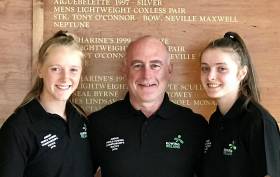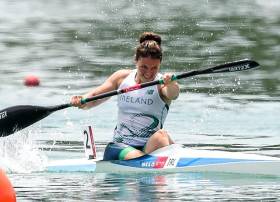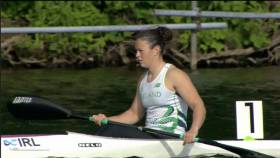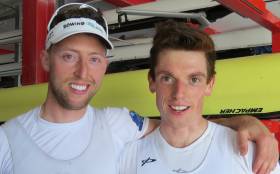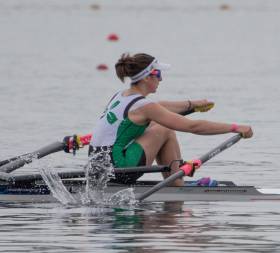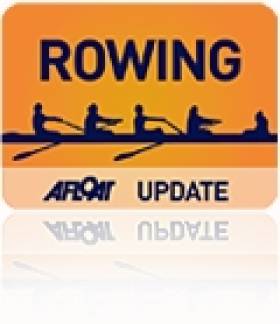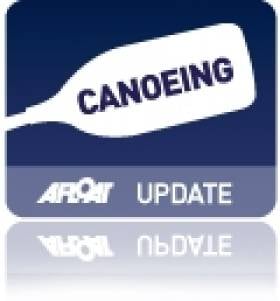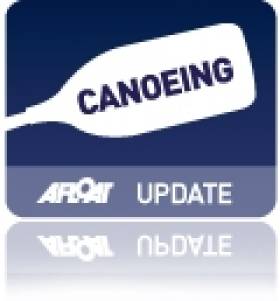Displaying items by tag: Racice
#Rowing: Ireland’s junior men’s quadruple took fourth in their heat and the junior women’s double fifth at the World Junior Championships at Racice in the Czech Republic.
Two boats qualified for the semi-finals from the heats of the quadruple, and Switzerland, New Zealand and Italy vied for these places in the second half of the race, with Italy missing out. Ireland were next in line.
Greece were convincing winners of their heat of the women’s double, grabbing hold of the one semi-final place on offer. Ciara Moynihan and Ciara Browne held fifth through the race.
Earlier, the Ireland junior men’s coxed four qualified from their heat. The junior women’s pair took fourth and face into a repechage.
The schedule was brought forward and races run at five-minute intervals because of the forecast of very high temperatures in the middle of the day.
World Junior Championships, Racice, Czech Republic (Irish interest)
Men
Four, coxed – Heat One (First Three to A/B Semi-Finals; rest to Repechage): 2 Ireland (C Mulready, J O’Donovan, F Driscoll, E Gaffney; cox: E Finnegan) 6:39.91.
Quadruple – Heat One (First Two to A/B Semi-Finals; rest to Repechage): 3 Ireland (L Hayes Nally, A Byrne, J Dorney, J Keating) 6:13.31.
Women
Pair – Heat Three (First Three to A/B Semi-Finals; rest to Repechage): 4 Ireland (G McGirr, E O’Reilly) 7:54.87
Double – Heat Two (First to A/B Semi-Final; rest to Repechage): 5 Ireland (C Moynihan, C Browne) 7:47.20.
#Rowing: Ireland had a good start to their campaign in the World Junior Championships. The Ireland coxed four of Conor Mulready, James O’Donovan, Fintan O’Driscoll, Eoin Gaffney and cox Eoin Finnegan took a good second place in their heat, comfortably qualifying for their semi-finals as the second of three qualifiers. Canada won and Russia came through in third.
In the women’s junior pair, Gill McGirr and Eliza O’Reilly took fourth in their heat and will face into a repechage. The United States won – by an extraordinary margin – from Canada, while Britain came through in their own battle for third with Ireland.
World Junior Championships, Racice, Czech Republic (Irish interest)
Men
Four, coxed – Heat One (First Three to A/B Semi-Finals; rest to Repechage): 2 Ireland (C Mulready, J O’Donovan, F Driscoll, E Gaffney; cox: E Finnegan) 6:39.91.
Women
Pair – Heat Three (First Three to A/B Semi-Finals; rest to Repechage): 4 Ireland (G McGirr, E O’Reilly) 7:54.87
Egan Tenth In Dramatic World Championship Final
#Canoeing: Ireland’s Jenny Egan finished 10th in the women’s K1 5,000 metres at the canoe sprint World Championships in Racice in the Czech Republic today. In a dramatic race, Dora Bodonyi of Hungary came out with the gold medal after a long battle with Tabea Medert of Germany, who took silver. Lani Belcher of Britain gritted it out as she found her way through the field and won bronze – near the end she clashed with Iuliana Salakhova of Russia, leaving the Russian in the water and out of the race.
Egan’s chances suffered in rough-and-tumble early stages. She fought hard through the race but could not catch up with the leading group.
Canoe Sprint World Championships, Racice, Czech Republic (Irish interest)
Women
K1 5000 Final: 1 Hungary 23 min 17.862 sec, 2 Germany 23:19.214, 3 Britain 23:28.236; 10 Ireland (J Egan) 24:34.562.
O'Leary Ninth in A Final as Egan Misses Out
#Canoeing: Patrick O’Leary finished ninth in the A Final of the KL3 200 metres at the Paracanoe World Championships in Racice in the Czech Republic. The race was won by Serhii Yemelianov of the Ukraine.
Jenny Egan finished eighth in her semi-final of the K1 200 at the Canoe Sprint World Championships, also at Racice. She missed out on an A or B Final place. Egan is set to compete in the K1 5,000 metres on Sunday.
Egan Qualifies for World Championships Semi-Final
#Canoeing: Jenny Egan has qualified for the semi-finals of the K1 200 metres at the Canoe Sprint World Championships. The Irish paddler finished seventh in her heat this morning in Racice in the Czech Republic, taking a place as one of the fastest losers. Her semi-final is secheduled for 2.44 Irish time on Saturday.
Ireland’s Patrick O’Leary will compete in the A Final of the KL3 200, part of the Paracanoe World Championships, also in Racice. O’Leary finished third in his semi-final. His final is scheduled for 1.30 Irish time on Saturday.
O'Driscoll and O'Donovan Give Classy Display
#Rowing: Mark O’Donovan and Shane O’Driscoll took advantage of the good conditions on the beautiful course to win their exhibition race in the men’s lightweight pair at the European Rowing Championships in Racice. The race counts in the allocation of lanes in the final, and Britain, represented by Joel Cassells and Sam Scrimgeour, and Ireland shot it out the last time this happened, at the World Cup in Belgrade. However, this time Ireland were in command from halfway, tested only by Italy, who finished second.
European Championships, Racice, Czech Republic, Day One (Selected Results; Irish interest)
Men
Lightweight Pair – Exhibition (Race for Lanes): 1 Ireland (M O’Donovan, S O’Driscoll) 6:57.77, 2 Italy 6:59.82, 3 Russia 7:01.75, 4 Britain (J Cassells, S Scrimgeour) 7:03.39.
Lightweight Double Sculls – Heats (Winner to A/B Semi-Finals; rest to Repechages) – Heat One: 1 France (P Houin, J Azou) 6:26.97. Heat Two: Germany (L Schaefer, J Osborne) 6:37.53.
Heat Three: 1 Poland 6:25.93, 2 Ireland (G O’Donovan, P O’Donovan) 6:32.15, 3 Russia 6:36.38, 4 Switzerland 6:40.60, 5 Austria. Heat Four: 1 Italy 6:30.77.
Women
Lightweight Single Sculls – Heat One (First Three to Semi-Finals; rest to Repechage): 1 Ireland (D Walsh) 7:44.85, 2 Denmark (A Runge Holmegaard) 7:49.49, 3 Poland (J Dorociak) 7:49.90; 4 Czech Republic 8:05.07, 5 Portugal 8:08.19. Heat Two: 1 Switzerland 7:42.510. Heat Three: 1 Sweden 7:39.52.
Walsh Wins European Heat in Impressive Fashion
#Rowing: Denise Walsh put in an impressive performance to win her heat of the lightweight single sculls at the European Rowing Championships in Racice in the Czech Republic. The bright sunshine had abated, but the Skibbereen woman took full advantage of the duller, tailwind conditions. She took a strong lead in the second half and was never truly tested from there. The small Ireland crowd cheered her over the line.
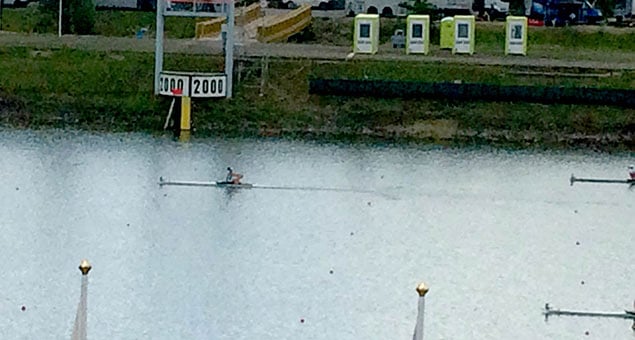 Denise Walsh crosses the line first in Racice this morning
Denise Walsh crosses the line first in Racice this morning
European Championships, Racice, Czech Republic, Day One (Selected Results; Irish interest)
Women
Lightweight Single Sculls – Heat One (First Three to Semi-Finals; rest to Repechage): 1 Ireland (D Walsh) 7:44.85, 2 Denmark 7:49.49, 3 Poland 7:49.90; 4 Czech Republic 8:05.07, 5 Portugal 8:08.19.
Two Ireland Crews for European Junior Championships
#ROWING: Ireland will send two crews to the European Junior Championships, the men’s quadruple and double sculls. The quad of Colm Hennessey, Eoghan Whittle, Patrick Munnelly and Andrew Goff won gold at last year’s Coupe de la Jeunesse, a European junior tournament, and will again represent Ireland in the Coupe this season. The double of Shane O’Connell and Ronan Byrne did well in recent testing. The European Junior Championships will be held at Racice in the Czech Republic on May 23rd and 24th.
#CANOEING: Jenny Egan brought Ireland a first senior medal at the European Canoe Sprint Championships when she took bronze in the Women’s K1 5,000 metres in Racice in the Czech Republic today. Egan, from the Salmon Leap club in Leixlip, was part of a successful breakaway at 1,000 metres with Maryna Litvinchuk of Belarus, who took gold, and Irene Burgo of Italy, the silver medallist. Less than two-thirds of a second divided the three.
Ireland paracanoeist Patrick O’Leary finished fourth in his KL3 200 metre final. Robert Oliver of Britain took gold. O’Leary was just a third off a second of taking bronze.
European Canoe Sprint Championships, Racice, Czech Republic (Selected Results; Irish interest)
Saturday
Men
K2 200 – Heat Three (First Three to A Final; 4-7 to B Final; rest out): 1 Serbia 31.676; 8 P Egan, S Dobrovolskis 34.808.
C1 200 - Heat Three (Winner to Final; second to seventh to semi-final): 1 Portugal (H Silva) 39.236; 7 A Jezierski 43.220. Semi-Final: Jezierski did not start.
K1 200 – Heat Two: 6 T Brennan 37.596. Semi-Final (First Three to A Final, 4-7 to B Final): 1 Latvia (A Rumjancevs) 36.072; 7 T Brennan 37.852
Paracanoe KL3 – A Final: 1 Britain (R Oliver) 40.88; 4 P O’Leary 42.536.
Women
K1 200 – Heat Three (Winner to Final; second to seventh to semi-final): 1 Serbia (N Moldovan) 40.236; 7 J Egan 43.384. Semi-Final (First Three to A Final, 4-7 to B Final): 1 Russia (N Podolskaya) 42.196; 7 Egan 45.344.
Sunday
Men
K1 200 – B Final: 5 T Brennan (14th overall)
K1 5,000 – A Final: 18 P Egan 22:58.09.
Women
K1 5,000 – A Final: 1 Belarus (M Litvinchuk) 22 mins 19.25 seconds, 2 Italy (I Burgo) 22:19.68, 3 Ireland (J Egan) 22 mins 19.9 seconds.
K1 500 – B Final 6 J Egan 2:00.376. (15th overall)
K1 200 – B Final: 7 J Egan 44.896 (16th overall)
#CANOEING: Andrzej Jezierski and Jenny Egan both finished seventh in 200m heats and must get through semi-finals if they are to reach the final at the European Canoe Sprint Championships in Racice in the Czech Republic. Both Jezierski and Egan must finish in the top three in the afternoon semi-final to make the A Final. Places four to seven would qualify them for the B Finals.
European Canoe Sprint Championships, Racice, Czech Republic (Selected Results; Irish interest)
Men
C1 200 - Heat Three (Winner to Final; second to seventh to semi-final): 1 Portugal (H Silva) 39.236; 7 A Jezierski 43.220
Women
K1 200 – Heat Three (Winner to Final; second to seventh to semi-final): 1 Serbia (N Moldovan) 40.236; 7 J Egan 43.384.



























